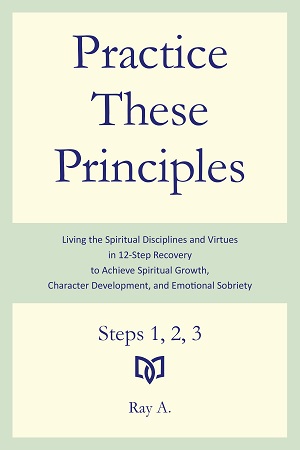
"The relationship between spiritual recovery and emotional sobriety is probably a gray area for most of us. There may be three reasons for this, all intimately related. One, we are not clear on what, practically speaking, a spiritual awakening is. The very idea of the spiritual being practical sounds like a contradiction in terms. Two, we are not certain what the principles are and in what specific ways they can be said to be spiritual and practiced as such, with the result that our practice, and hence our awakening, is inhibited. These two reasons we have already touched upon. The third we have not, and this is that we are mostly in the dark about what, from a spiritual point of view, the emotions are and how they function. The result is that our practice of the principles is not consciously directed to a specifically spiritual shaping and transformation of our emotional life. . . .
How then does AA understand the emotions, and how is it that a spiritual awakening and the practice of the principles work to shape and transform them so that we can achieve emotional sobriety?
In looking at the emotions spiritually, our first consideration is of necessity the understanding we have of their origin. The same applies to the understanding we have of the brain. The spiritual perspective of AA tells us that our ability to experience emotions is a faculty that has its source in God as our creator. This capacity is his gift to us, as are our rational, imaginative, creative and other powers. With mind and will, feelings are a constituent part of the human spirit. As such, the emotions are not a simple function of matter, a chance evolutionary product of our animal nature having little but survival value. They are not just physical sensations, neurological phenomena, and biochemical reactions, though these may be detected, identified, measured, and analyzed by the neuroscientist.
Second, as part of our spiritual endowment, the emotions cannot be properly regarded as psychological liabilities or burdens. They serve God’s purpose for our lives in the natural and human environments in which they are intended to function. Hence our goal is not to suppress or escape the emotions, to “manage” them so as to limit their negative impact, or to try to transcend them into a supposedly detached, enlightened, or pure spiritual state where we can be impervious to them. They are an integral part of our spiritual identity. What we seek is their redemption and wholesome restoration, their spiritual renewal and reordering.
Third, as an endowment of our spiritual and not only of our animal nature, the emotions are not simply spontaneous or instinctive reactions to natural or environmental stimuli. Such a deterministic view is widespread and is mirrored in the typical dictionary definition of an emotion. This assumes that we can exercise little influence or gain any mastery over our emotions.
If this were the case it would be pointless to talk about achieving emotional sobriety. We would be hapless victims of our own feelings. But a spiritual view of things tells us this is not the case, for God gave us free will, and if we are to be free moral agents—able to choose how to act out of our God-given capacities, whether for good or for ill—then we have to be capable of emotional freedom. Common sense and ordinary experience tell us that we are.
This connection between free moral agency and emotional freedom is the reason why character development and emotional sobriety are two aspects of the same process of recovery. Our growth in one affects our growth in the other. Character development is a gradual process of acquiring virtue through repeated practice of right action, right intention, and right emotion. We cannot grow in character without an accompanying growth in our emotional disposition, for virtuous character and virtuous emotion work off each other, just as character defects and defective emotions do.
We recall that our spiritual awakening and the character growth that accompanies it can be seen simply but accurately as a process of “attitude adjustment.” Beginning with the most elementary virtue—willingness—and continuing with the gradual but growing practice of the other virtues and the disciplines that make up the spiritual principles, these attitude adjustments multiply and accumulate, displacing our old ideas and awakening in us an increasingly spiritual view of things.
This in turn enables us to carry our practice of the principles to new levels and areas of our life. As we persevere in their pursuit, over time the virtues become engrained in us as permanent character traits, weeding out the character defects long rooted in us, defects that we now willingly surrender. We develop a habitual, settled disposition to the good in all we do.
Even as we do this, however, most of us find that emotional growth lags behind character building, so that our moral disposition to do right is often limited by our emotional inability to feel right. Anger, fear, resentment and a variety of other emotions, while less damaging than when we drank, continue nevertheless to undermine and sabotage our moral effort. Our moral and our emotional dispositions are at odds. We are still unable to do that which we now know to be right and which we very much want to do. We need to add to moral, emotional virtue, to right character, right emotions. We can do this if we tie character and emotion to a rightly spiritual view and practice of the virtues."
– From "Emotions, Spiritually Speaking," pp. 41, 43, 44–45,